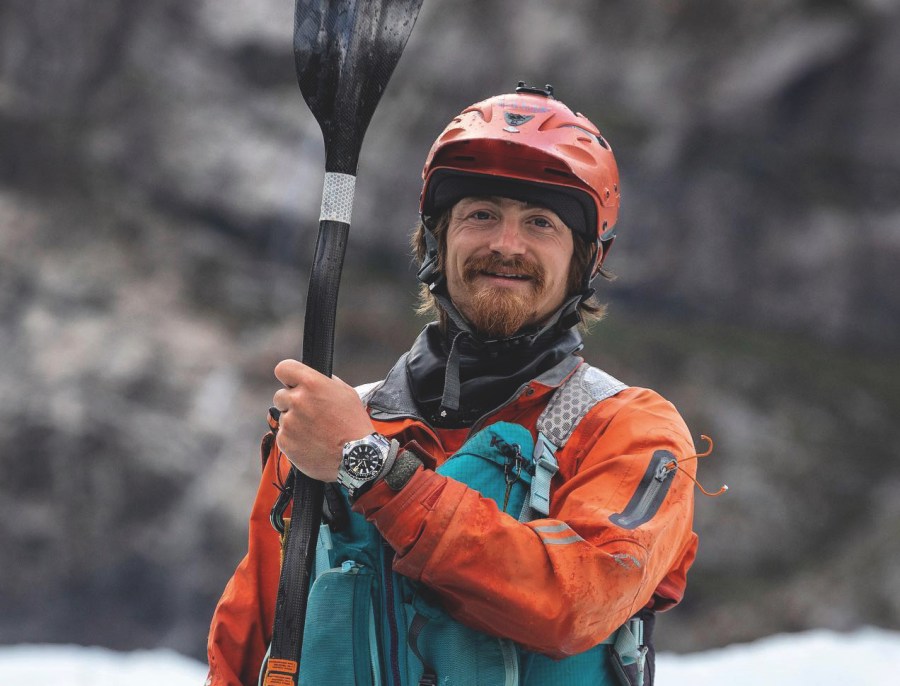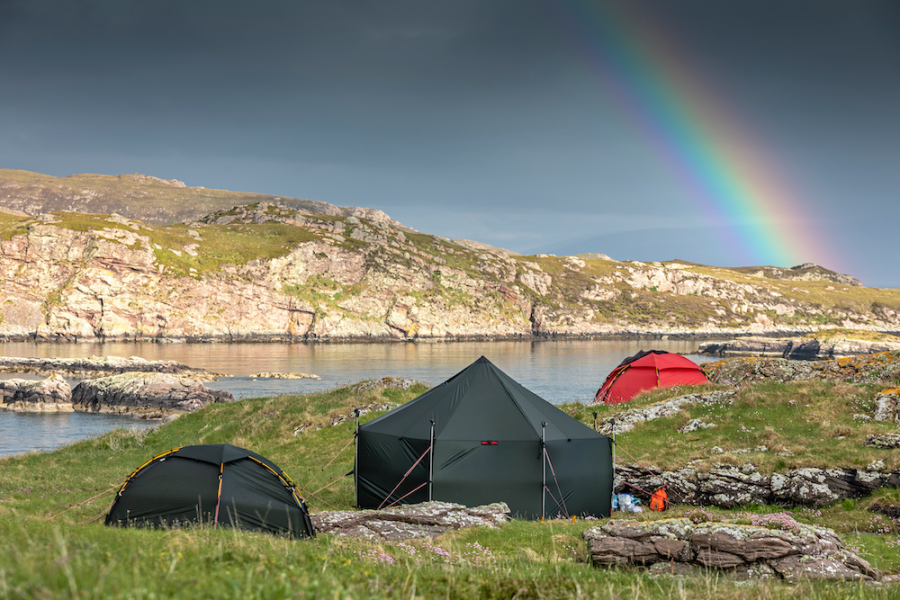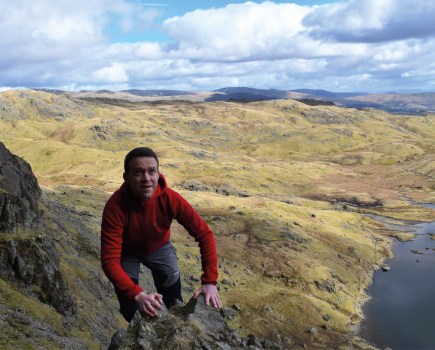Outdoor adventures rarely go perfectly to plan – but for long-distance backpacker, kayak guide and adventurer Will Copestake, mistakes are an essential part of the process of growth.
Will Copestake splits his time as a kayak guide between two iconic areas of the globe: his Scotland home and the Patagonia coast. He’s had many years to think about what an adventure is and how he leads others to have one of their own.
“I like to take people to places that get them cold, get them wet, that expose them to elements. But I like to instill a sense that they’re safe and they’re in control… and that comes really through sharing experience, and discussing, and letting them, to a degree, discover it themselves,” he says.
Main image: The unspoiled solitude and glacier views in Patagonia keep Will coming back | Photo: Will Copestake/willcopestakemedia.com
This advertising feature is sponsored by our friends at Hilleberg.
Will spent his childhood romping through the wilds of northern Scotland as his own outdoor playground. As a possibly naïve teenager, he was most accustomed to overnight wild camping trips with his family. Undaunted, he determined that his first big trek would be an 80km (50 mile) solo hike, done in two days, through daunting wilderness in New Zealand’s well-known Great Walks system.

Will always brings a smile, whether he’s guiding a kayak trip or on his own. Photo: Will Copestake/willcopestakemedia.com
Less than halfway through day one, he had already managed to lose most of his food in a tumble that ruptured his pack. This mishap, along with his unsustainable pace, forced Will to bail from his trip early; but that’s not to say he gained nothing from the experience. The next time he knew to pack a bit lighter, aim for a lower daily mileage and better organise his gear.
Will started, like many people do, with only an excitement for adventure and learned the rest as he went. His first experience on that New Zealand trip was less than ideal, but he would go on to spend the next 10 months on the other Great Walks trails, becoming more and more captivated by the wilderness as he went.
“I think pretty much every trip I’ve ever been on I’ve had something not go to plan,” he says, “You’ll figure it out – there is a way to deal with most things – and then after that’s done, you think about, you talk about it, you reflect on it and then you’ve learned a new skill to use on the next trip.”
This ethos recalls Bo Hilleberg, Hilleberg’s founder, who fell in love with nature (and learning how to solve the problems he encountered) both as a special forces soldier and as a forester in the 1970s. He chose to solve his biggest ‘problem’ by creating his own tents.
Whilst Will’s first steps were unsure, every stumble along the way taught him something new that could be used next time. Now, he’s able to set out confidently every adventure he takes. “The hardest thing by a country mile is getting the permit to actually begin the trip,” Will jokes.
The trip preparation can sometimes be more convoluted than the actual journey. Will does a thorough job of plotting out his route in advance, giving himself extra time for the unplanned things that he knows will come up. “I like it when things go a little bit wrong. Obviously you don’t want things to go very wrong, and things tend to go very wrong when there’s lots of things missed out. If you’ve got barriers in place to stop that… then it’s solvable,” he says.
One of those “barriers” is Will’s choice in Hilleberg tents, which provide reliable refuge from the unforgiving weather in the regions he loves.
Tents for any season
For an upcoming 40-day expedition in Patagonia, he will take his “go-to paddling tent” – the Red Label Allak – to protect him from winds that could potentially reach 90 -100 mph. “I’ll be using sand pegs a lot, I suspect,” he laughs. The Allak’s spaciousness and versatility, along with its two vestibules, gives Will flexibility with gear storage, entry and exit options – and even room for repairing his kayak when needed. And its fully freestanding construction makes it especially great for tricky pitching conditions like sandy or rocky beaches, which Will often encounters on his paddling trips.
When Will goes solo he opts for a Soulo, either the Black Label or Red Label version. Like the Allak, it has a fully freestanding construction, and he has used it in all seasons and conditions for many years with great results. “I wanted a tent that I could use solo in strong winds reliably and pitch easily, especially on my own in high wind conditions,” he says.

The Soulo (left), Altai (middle), and Allak (right) make Will’s perfect tent kit for guided trips. Photo: Will Copestake/willcopestakemedia.com
“I think pretty much every trip I’ve ever been on I’ve had something not go to plan. You’ll figure it out, you reflect on it, and then you’ve learned a new skill to use on the next trip.”
Having used the Soulo in wind speeds over 100mph, Will knew he could trust it completely for his 364-day journey to complete a solo kayak circumnavigation of Scotland and summit the 282 Munro mountains, which are all over 3000 feet (914.4 metres) tall. This adventure earned him the 2015 Adventurer of the Year award across Britain from the National Adventure Awards.
For solo trips in snow-free conditions, Will favours the Yellow Label Niak. Its light weight makes ‘sizing up’ – using a two-person tent for one person – an easy choice. Its palatial space provides extra comfort, which is not a luxury but an essential for Will on his longer trips. He also appreciates the simplicity of the Niak and how quick it is to pitch.
Will’s guided group trips wouldn’t be complete without his Blue Label Altai, which he fondly calls “the megatent.” He finds its spacious yurt-style construction “surprisingly wind-tolerant” and “pretty bombproof,” making it his go-to tent for group gatherings, and trips where protection from both pesky midges and rough weather are important considerations.
Personal discoveries
As a guide, Will is responsible for keeping people safe; but he finds it’s equally important to share his hard-earned wisdom – particularly his belief that exploration is not a challenge, but an opportunity to have fun. “Really what we’re doing is we’re giving ourselves a break in routine and a break in reality. And you could argue that the outdoors is the real reality, but nowadays for most of us it isn’t. It’s giving ourselves a little shift in routine, and that’s important I think,” he says, “You don’t learn by having instructions shouted at you; you learn by discovery.”
Will has enjoyed countless nights making his own personal discoveries in the wilderness under the cover of Hilleberg tents. In years past, he has spent more days in a tent than in a permanent structure. No matter the model, “I find I can sleep perfectly comfortably in a tent every night,” Will says. “I like that you can hear the world around you, I like that you can hear the flap of the wind on the fabric. It’s really the simplicity of it that I like.”
With a Hilleberg tent, he adds, you can count on your safety and comfort, so you can focus more on enjoying your journey and learning to appreciate the small mistakes made along the way. “You go out and make loads of mistakes – and I’m still making mistakes, and always will be making mistakes,” Will says, smiling.
Adventures rarely go perfectly according to plan, and it’s in these moments that beginners and experienced adventurers alike grow the most.

![2-Will Copestake IMG_4465[43]](https://www.thegreatoutdoorsmag.com/wp-content/uploads/sites/15/2023/04/Best-hiking-gloves-guide-1.png?w=900)






